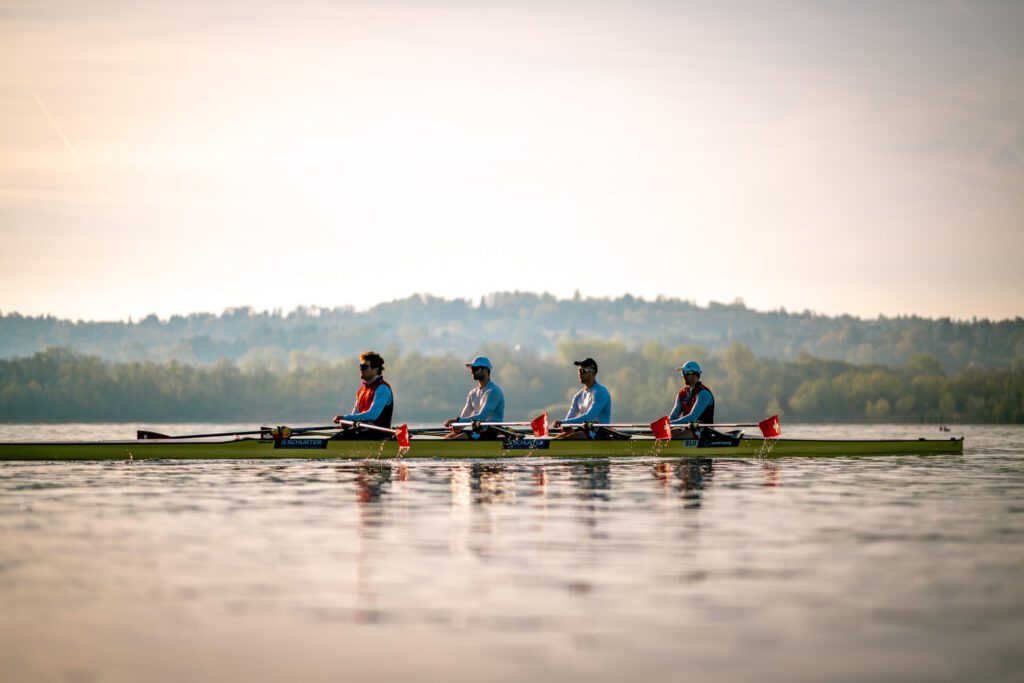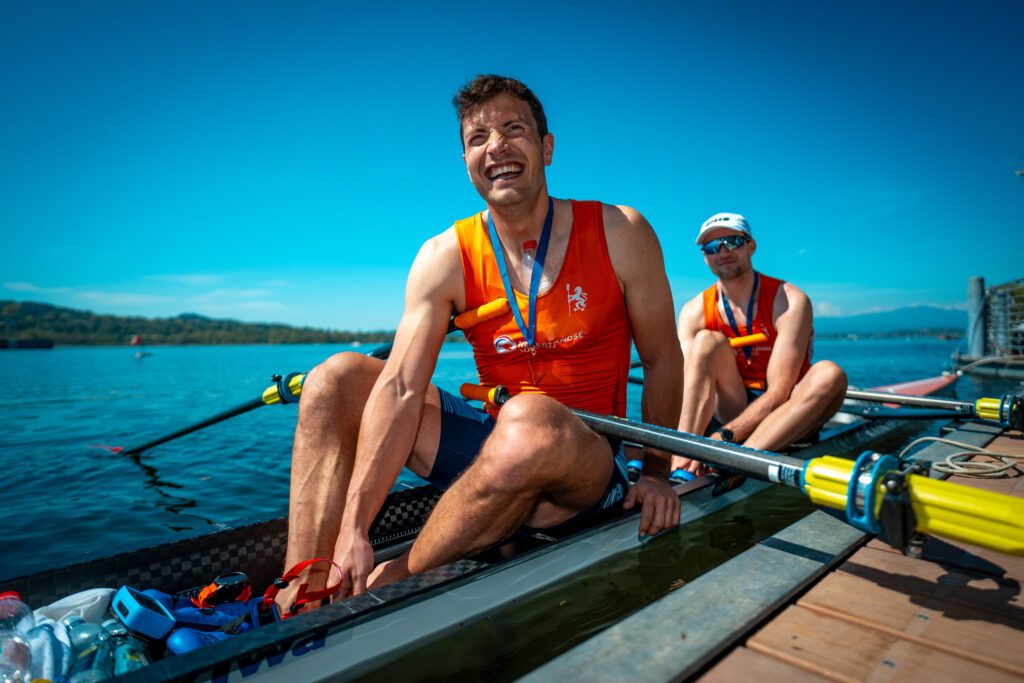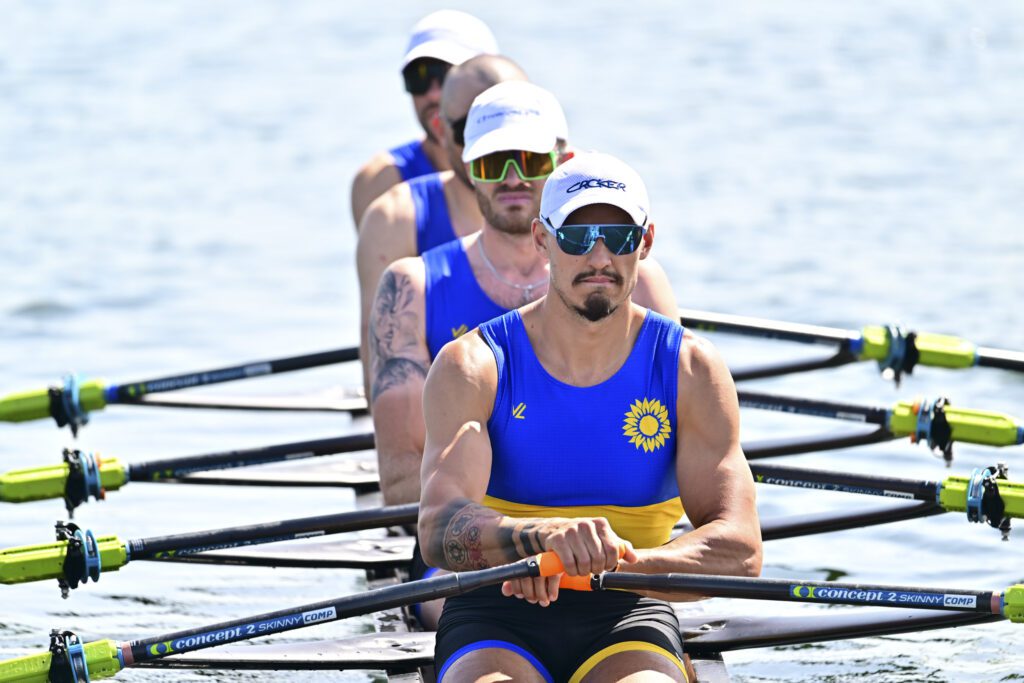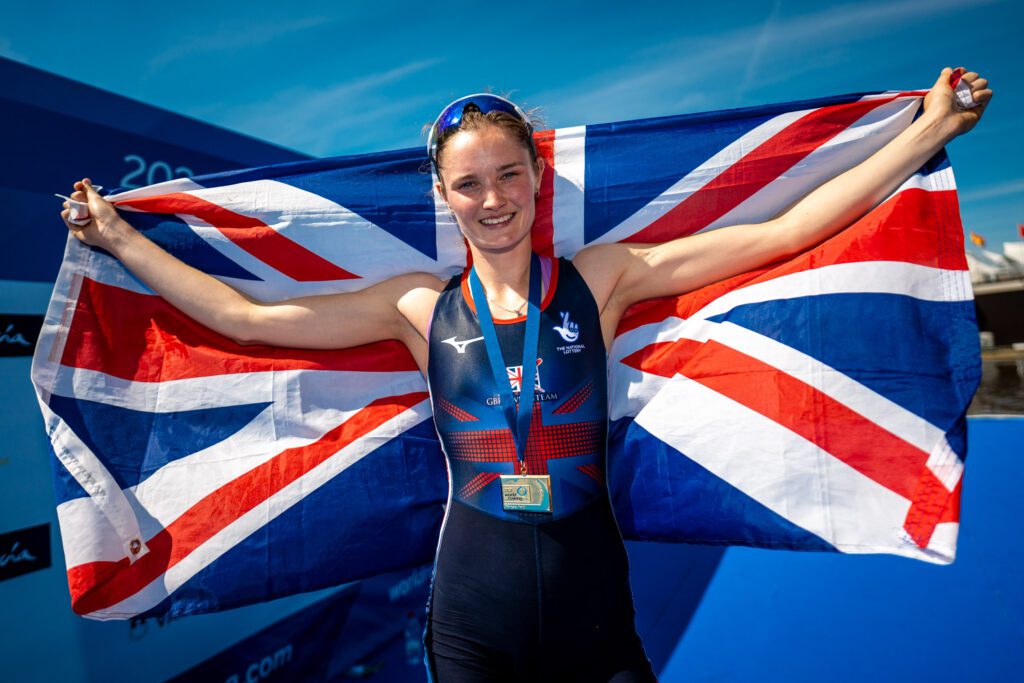USRowing CEO Amanda Kraus reflects on her first year in the job. She shares the lessons learnt, battles won, and the vision she strives towards for USRowing. Since speaking with Row360 for this interview, Amanda Kraus announced that Josy Verdonkschot will be USRowing’s new Chief High Performance Officer.
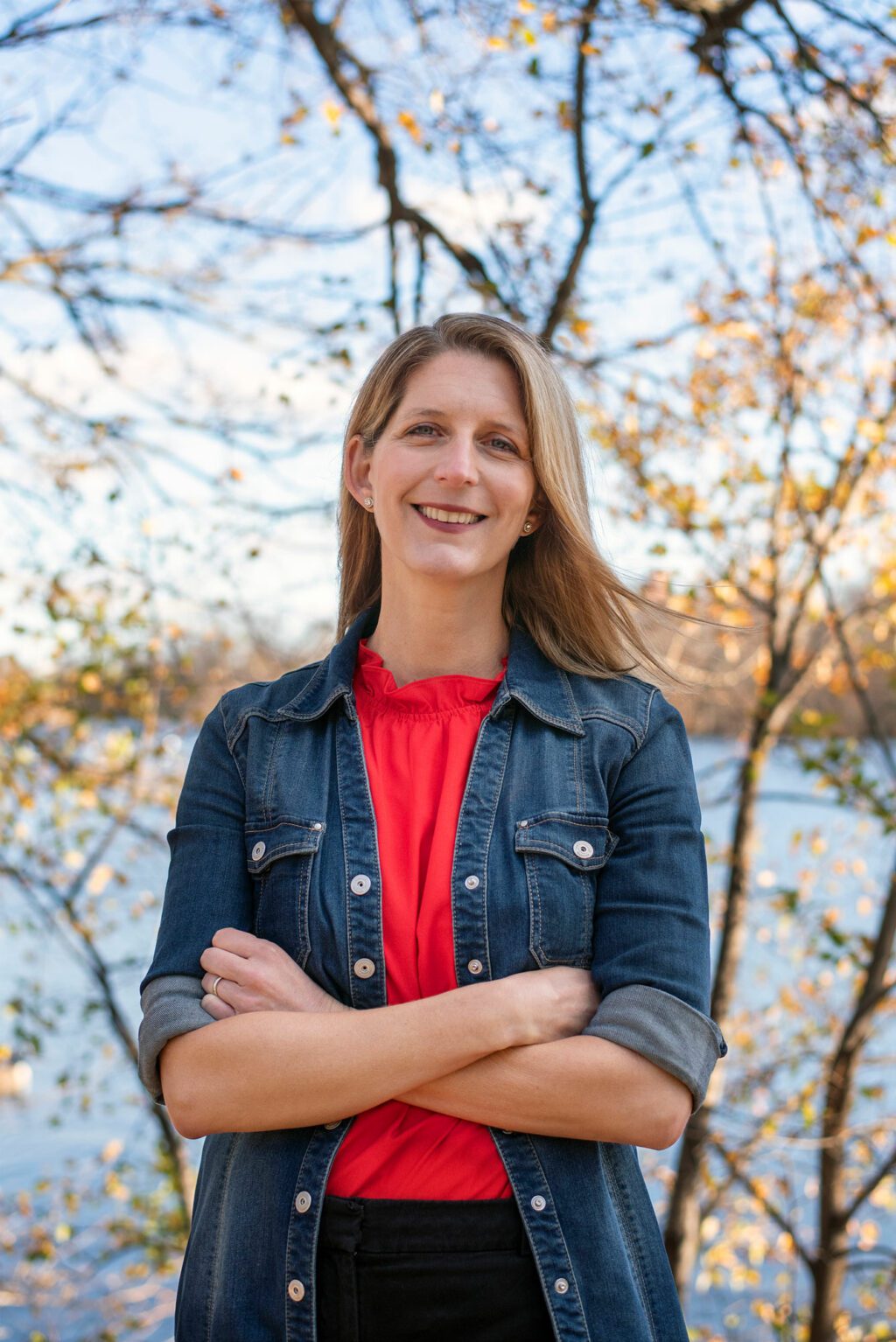
When you spoke to Row360 a year ago, having just started at USRowing, you outlined four key ambitions. They were:
↘ Improve USRowing’s reputation
↘ Build a sustainable financial model
↘ Ensure US crews represent the diversity of the US
↘ Support the national team to be the best in the world
How’s progress?
Yeah, what was I thinking!? [Laughs] There’s been a lot of progress. At times I felt we weren’t doing enough or going fast enough but it is a lean team here at USRowing and everyone is working incredibly hard.
I’ll start with infrastructure because in many ways, although USRowing is not a young national governing body and nor is it small – we have a $13m operating budget – it operated like a start-up. USRowing had and still has many incredible programs but the infrastructure wasn’t in place to bolster and support them. I don’t think that’s unique to USRowing, it happens in other organisations too. There’s a focus on programs, programs, programs, and no one is taking care of the house. No one is thinking about the fundamentals. That’s something I’ve been focusing on and continue to focus on. It’s about systems and staffing. How do we function? How do we operate? What systems do we use? Can we get the right people on the team?
We have a robust development team now. It has three and half people, three full-time and one part-time person. They run events, raise funds and bring on corporate sponsors. They are doing an incredible job and their focus is to bring in revenue and fundraising-dollars.
We’ve built up the marketing team, so that we can tell our story, and the story of our rowers around the country. They’re doing a phenomenal job, and they are about to release our new brand. So, lots of progress on that front.
When I started, outside of a membership database managed externally, we didn’t even have our own database to house our contacts. I’m happy to report that we now have Salesforce up and running. That’s an example of me thinking oh well in a few months we’ll have that built out and I found out that for a lack of a better word it is a bit of triage. I wanted to do thirty things in year one: but you can’t. If we had unlimited resources and staff, then yes, but we don’t. So, we pick ten things, map the next ten for next year, and the next ten after that. There is still a lot to do but we’re making progress.
“One frustrating afternoon, I was talking to a mentor of mine from Row New York, and he said, “Amanda did you think this was going to change in a year? This is going to take years to fix. Years”. It might sound obvious, but it wasn’t obvious to me.”
Amanda Kraus
Generating revenue was the second thing. Are we capturing opportunities there? For example, we’ve been absorbing skyrocketing insurance costs and we haven’t kept pace on the dues side i.e., what we charge the membership. It is just about making good business decisions for the organisation.
I don’t think it is a secret that we were not happy with our Tokyo performance this summer beside the Para four who had a wonderful race. We didn’t perform the way we wanted to. The national team situation is in progress right now, we are hiring a new head of high performance and that search is ongoing. We’re thinking about how we become an athlete-centred organisation, and how we develop relationships with athletes and take good care of them.
The last piece was around making the sport more diverse and more inclusive. The most exciting update is that we’ve bought STEM to Stern under the roof of USRowing. It is a program run by Will Bott, within existing middle school programs. They create a program to help bring in kids from under-resourced communities and provide technical support such as swim lessons, DEI training, and academic support. The ambition is that our youth programs can better represent the diversity of this country. That’s where it all starts if we want our national teams to be more diverse and inclusive, you have to start young, you can’t just snap your fingers and it’s done.
On the reputation front, it is interesting you ask as I was recently at a boathouse and as I walked in someone said, “I hate USRowing”. My hosts were embarrassed, and I said, “no, it’s completely fine”. I share that story because I don’t think it is uncommon for people to feel like that. It’s not a secret – we don’t have a stellar reputation as an organisation. That’s not because there aren’t incredible people working here, who are great stewards of the sport. I think we’ve previously lacked leadership and infrastructure and on certain fronts we have not done a good job of stewarding our sport. What I’ve learnt though is that changing the reputation is not like flipping a switch. I couldn’t just walk in and say, I’ve switched us to good now. Understandably, a good reputation needs to be earned – and that takes time, and it takes trust. The proof is in the pudding. I wish that we were further along than we are right now. We just have to do the work and prove that we can be trusted and that we are bringing value. I am confident that we will.
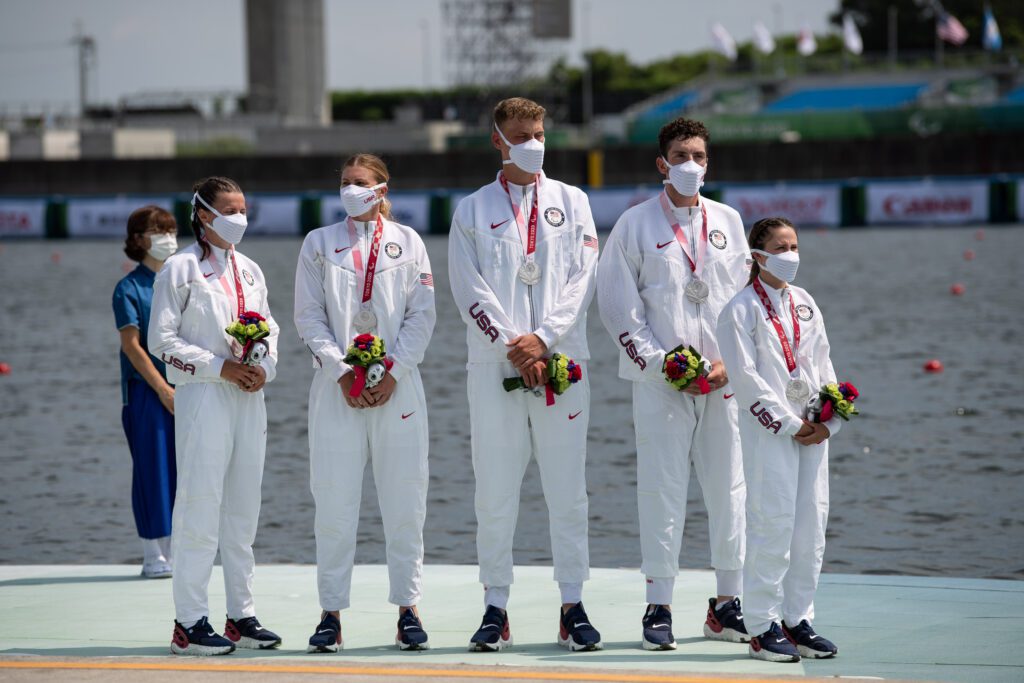
Photo USA PR3 Mix4+
Credit Benedict Tufnell
Was the lack of medals on the Olympic side a surprise?
I’ll start this by saying: I still feel new in this role. When I started in November 2020 I had no prior experience in high performance, and I came in very new and very fresh. I tried absorbing everything that I could from day one.
From where I was sitting as a lay person, I wasn’t terribly surprised. There were challenges. The USOPC started an assessment of USRowing in January of 2021 and that was one of the first pieces I inherited. There were issues with personnel, the culture of the training centre, and communication. Since then, the USOPC has come out with their report. It touches on specific challenges required within our national team system, issues around confidentiality, conflict of interest, communication, selection. It’s a long list. So, given all that I wasn’t thinking we were going to go to Tokyo and come home with three or four medals. If I were a betting person, I wouldn’t have put money on that based on Covid and all the other challenges.
That said, I knew we had, and have, incredible athletes and some talented coaches, so I did go in thinking, well maybe we’ll pull something out. There were so many unknowns, and it could have gone either way. I do worry that right after the Games, when I said we need change people mistook that for a post-Olympic response. I thought we needed to change before the Olympics so that statement wasn’t because of what happened in Tokyo. I could have said that in May or June, our lacklustre performance in Tokyo hit home even more the need for change.
Looking back on your first year, what do you think were your biggest misconceptions about the job going into it?
I absolutely thought that change would be easier and faster.
One frustrating afternoon, I was talking to a mentor of mine from Row New York, and he said, “Amanda did you think this was going to change in a year? This is going to take years to fix. Years”. It might sound obvious, but it wasn’t obvious to me. I thought I’ll come in, and I will listen and identify the pain points and then I will make changes. I underestimated how much was involved in shifting an organisation and how difficult and time consuming it is, and how long it takes to see the change. That conversation was one of the bigger ah-ha moments. It is hard though because I’m not that patient. Even at the very beginning, one month in, I remember thinking to myself it is already December – and then thinking Amanda you are ridiculous.
“It’s like coming out of a major car accident with a bruised finger – you’d not care about the bruised finger because you’re basically unscathed.”
Amanda Kraus
Given your new understanding of the situation, what organisational changes are you pushing?
I’d say a few big things. Well, let me back up a little bit. The first year keeps reminding me of being a novice rower. For a novice rower it is all about learning how to be a rower, carry the boat, get the boat in the water, and figuring out all the little things with your teammates – in the beginning it is not about going fast.
Year one was baby steps. How does this organisation function? What are our roles? Who is on my team? And then we came out of that and got to the point of, okay now I need to get the right people in the boat. And we made very good progress on that front; there’s a new head of marketing and communications and we’re unveiling a new brand very soon. It is beautiful and I’m excited about it. It is important to have someone who can tell our story well and the story of our rowers.
I’d say a huge win is building our own development team who are fully committed to raising money for USRowing. And we’ve created a Diversity Equity and Inclusion (DEI) Committee to help make the sport more diverse and inclusive.
I’ve started to build relationships with the national team athletes, to get to know them directly. I’ve gone to practices and met the athletes and asked them a lot of questions and taken the time to learn more.
On the governance front I’d say we had a huge win in the fall as our membership successfully voted in a change in our by-laws. It was by a vast majority: 75% in favour of changing our bylaws to change the structure of our governing board. It will be incredibly impactful in the years to come, and as soon as the spring we will start to feel the difference on that front.
So, while I would say there have been times when I have felt frustrated or that change is happening slowly – I do remind myself and our members that wait these things are going well.
We’ve also hired a new head of programs on the domestic side who is going to be an enormous contributor and I know our members are going to feel that change really quickly.
When you spoke to Row360 a year ago you described USRowing as feeling like a start-up. Why? And has that changed?
I did feel like it was a start-up and in some ways I still do.
When I arrived, we were fully in Covid, there was no vaccine, and the staff had been cut dramatically and as I said a lot of infrastructure was not in place. It made me feel like, wow we are a start-up in ways we shouldn’t be. And, in some way, we are still like that even though we’re making progress.
As a founder of an organisation, you build something from the ground up. What’s good you can take credit for, and what’s not functioning you can take responsibility for. That’s how I felt at Row New York but coming into USRowing was like coming into somebody else’s home. In your home you eat at a certain time, or the kids do the dishes, or you sit in a certain seat or function in a way which isn’t better or worse than any other home, but it is just the way things are done. Coming into a completely new organisation and being in charge of it was such a unique, interesting, and sometimes challenging experience. You are both looked upon to run the organisation and at the same time there is, already, an existing way of doing things. You’re in somebody else’s home. And there were positive things in terms of the culture I walked into, and I thought oh this is lovely. So, it wasn’t necessarily a negative it was just a real learning experience for me.
You spent nearly two decades helping under-resourced children in New York. What do you care about high performance athletes winning gold medals?
There have been people that have asked not only what do you care, but what do you know about that world. And I’d say I knew very little. I’ve spent hundreds of hours over this past year learning about high performance not just in this country but internationally too.
My job is not to jump in the launch and drill catches or identify rowing talent. I’m an administrator. My job is to find the right people to do all those things, as well as to set the culture, and create a good business model.
I was a collegiate rower so I understand the sport, and, yes, there would be advantages to having lived experience as a national team member, but I have advantages coming in as someone who has run an organisation, raised money, created programs and hired incredible people. There is also a benefit coming in with a fresh perspective. I’m not entrenched by several decades of historic national team politics. I can ask questions and make smart decisions based on what I’ve learnt. And make sure we hire the right people to develop our program and to coach our athletes. I don’t find that daunting, it is all about finding the right people and I am confident I can.
Other international rowing NGBs receive significant government funding but USRowing does not. How do you keep afloat?
We rely heavily on USOPC, that’s our biggest chunk of funding. The rest is from generous individuals, mostly national team alumni who support the current team. And a little bit of corporate support. I was surprised myself to learn that we didn’t receive any government support. There are no other revenue streams to pay for all the expenses related to running the national team which is well over $4m a year; and $1.5 and change is from the USOPC. That is quite a gap. I don’t know enough of the history to explain why the dollars haven’t been raised in the past by USRowing. I can say for sure the staffing wasn’t there. Fundraising 101, if no one is there to do the fundraising then it’s impossible to raise the dollars. That is why one of my first priorities was making sure that we had a development team within our staff.
“I don’t think it is a secret that we were not happy with our Tokyo performance this summer beside the Para four who had a wonderful race. We didn’t perform the way we wanted to.”
Amanda Kraus
Can you explain the situation between USRowing and the National Rowing Foundation (NRF)?
The NRF was founded in 1966 by a small group who wanted to provide financial support to the national team. USRowing wasn’t bringing in enough funding for the national team and there wasn’t enough from the USOPC, so they played an invaluable part making our sport possible for the elite athletes. As an organisation that is what they do; they exist to raise money to support the national team.
Before I started, I made it very clear to the board of directors at USRowing that we needed a fundraising team within USRowing. There cannot be a disconnect between the national governing body and a separate fundraising organisation. When it works, it works well. When that funding comes over, it’s great but there have been times when the NRF held back the funding as they were not happy with the way USRowing was running things.
It is not my place to comment on whether that was warranted or not, or what was done on the part of USRowing; I wasn’t there for any of it. What I do know is that to be a functional well-run well-supported organisation we have to be shoulder-to-shoulder and fully aligned with the individuals or the entity that is raising money to do what we need to do. Long story short there was an effort to bring the NRF in and merge with USRowing. There was a real interest on the part of a few members of the NRF to make sure there was board representation on the USRowing board. That was not something we were able to put in place – we would need membership support to make that sort of governance change. At that point the NRF was no longer interested in a merger with USRowing.
Moving forward we have our own development team. We are raising money for the national team, for DEI in rowing, and for coaching education. And we are creating a USRowing foundation. I believe the NRF is going to continue to raise money and they have a significant endowment. The last I heard they were still raising money for the national team, and they would accept applications for support – but I don’t know any of the details there. It is all positive.
People have said, you’re alienating the NRF, and making them feel like they are not valued. That’s disappointing to me, that was not the intention at all. The intent is to make it clear what we are raising money for and be shoulder-to-shoulder with the people we are raising money with. I’m hopeful that we can move past any of the distractions and refocus on raising money to support our athletes, and all the other things that we are trying to do.
What’s working well in USRowing at the moment?
The sport is growing. Any time I’m at a boathouse my favourite thing is to see a youth practice going out and lots of kids carrying their boats and having fun together; that to me is working. At the end of the day we all love this sport and enjoy getting our hands on a boat and going out with people we admire, people we care about, and people we want to work hard with. So, to see that alive and well and taking place across the country is great. That’s working.
Within USRowing what is working is that we are getting some incredible staff who are great resources to rowers, coaches, and clubs across the country. And that’s our job, to not just keep rowers safe but to coach coaches and to generate enthusiasm for the sport and growth for the sport. We talk a lot about opening the boathouse doors. And we are seeing that. When I go to regattas, I’m starting to see that shift – very slowly the young people at our regattas are better reflecting the diversity of our country. USRowing is leading the way on that front. We are not apologising for calling our own sport out as being too small in terms of who we are welcoming and what they look like and what their backgrounds are. For too long we have said of course anyone can do this, but that is very different from saying hey you, you should try this, and you come and do this. We want everyone to be welcomed into this sport because they are welcome. That’s something else that is working.
There are people who will absolutely say no that is a bad thing. I have an inbox full of those. As one of my middle schoolers would say, well that’s your opinion. Those are people’s opinions, and they are entitled to have their opinion. But I love it when I am at a regatta, and I will have somebody come up to me – in fact it happened at the Masters Nationals this summer. This little woman in her eighties took one of my hands in both of her hands and she looked up and said, “I love what you’re doing, I love what you are doing for this sport. When I was a young woman before I was even allowed to row, I never could have imagined a woman leading this sport and making it more diverse.” It was very sweet. So, as hard as some moments are I remind myself that we are effecting change and there are a lot of things that are working.
“We talk a lot about opening the boathouse doors. When I go to regattas, I’m starting to see that shift – very slowly the young people at our regattas are better reflecting the diversity of our country.”
Amanda Kraus
How much resilience is required in this role?
It’s interesting I didn’t get that push back at Row New York. People who were attracted to Row New York were by definition those who wanted to help make this sport more diverse and inclusive. No one volunteered and then said, I don’t want young people of colour participating in this sport, or why are you even making this a thing. It was a self-selected group.
We have almost 70,000 members at USRowing. So, I do get feedback from people saying, why are you talking about trans athletes, why are you making comments about anti-racism, why are you making this a thing, just focus on the sport. It is our responsibility to explain why we are doing this. People out there, who haven’t felt welcome in the past, need to know that the governing body is waving the flag and saying yes you are welcome.
At the beginning it was jarring. I would read emails out loud to my husband and he would say, Amanda stop, please don’t respond to these, don’t feed that fire. I’ve come to realise it is good to get this feedback because then I know the work is important. And we should be absorbing this feedback – that’s our role. The reason there hasn’t been more change sooner is because it is hard. But it is important, and it is fine to be on the receiving end – I don’t lose any sleep over it.
What does keep you up at night?
Nothing keeps me up at night. I’m a good sleeper; but what are my worries? There are so many things to worry about that it becomes a tree of triage. There are often times I think, wow if this and this and this weren’t happening, then I’d be way more worried about that.
It’s like coming out of a major car accident with a bruised finger – you’d not care about the bruised finger because you’re basically unscathed. A mantra I had at Row New York, and I still carry it with me now, is that there is nothing truly terrible that could happen unless it was something terrible that happened to the young people in our program. I think the same now in this role at USRowing, there is nothing insurmountable as long as the rowers are okay. Unfortunately, when there is a tragedy – which there are – that gets to me. That’s too much.
Everything else is fixable – whether it be finance issues, fundraising, or people getting upset about something – it is all fixable. It becomes a matter of how to prioritise all the things that could keep you up at night.
What are the barriers stopping you achieving your vision for USRowing?
I think about that a lot. Going back to what we were talking about earlier, I had these illusions that I would come in and do X, Y, and Z. Then there was a realisation – the basics of change management are, you have to share the vision, you have to get buy-in on the vision, and you have to get the team aligned, and then take people along with you as opposed to saying, well here is what we are doing. That takes time.
It can feel like we don’t have a lot of time. And we also don’t have a lot of resources. The barriers around not having enough staff; when I came in, USRowing had made cuts due to Covid so we were very bare bones on the staff side. We were missing expertise around talent development, marketing, fundraising, finance, operations, it is a long list. Those are barriers right away that we are now getting through.
Another thing to navigate is how do you keep yourself and the team focused on the priorities. There is constant flow into the inbox – and the inbox is the literal inbox but also the phone and social media. A flow of, focus on this, pay attention to this, hey what about this. It takes discipline to say, thank you but this is what we are focused on right now. And it is tough because we want to please. It is a shift in the culture and that’s hard.
“My job is not to jump in the launch and drill catches or identify rowing talent. My job is to find the right people to do all those things.”
Amanda Kraus
How close are you to finding the next Performance Director of USRowing?
Since September we have been running an extensive international search. We have a search committee that has been very involved. We have done multiple rounds of interviews and asked questions and received written responses. But to answer your question we hope to name someone by the end of the year.
There was speculation surrounding Sir Steve Redgrave. Can you shed any light on those talks?
A couple of members of the NRF brought Sir Steve forward as a candidate to play a role here in high performance. It was a wonderful connection to have made. The idea was to see if there was a role for him here, either as a sort of ambassador – he would of course bring incredible enthusiasm and generate excitement around the sport because there is no more accomplished rower. So, yes, he was a candidate.
What’s the perfect candidate, do they even exist?
No. I’ve been referring to that person as a unicorn. I shouldn’t say that. I’m going to retract that. Getting alignment in this country around what ‘perfect’ looks like doesn’t exist.
The perfect person would have been an Olympian – bonus points if they were successful – they would have been a coach, they would have successfully run a high-performance program, they would have a background in physiology, sports psychology, and a masters degree in business. They would be an incredible manager, recruiter of talent, developer of talent and they would be empathetic. They would bring a certain level of gravitas, extra points if they have a British accent, and they also must want to live in the United States and want the job. I don’t know who that person is! Does that person exist? If they do, then let me know.
That said, there are people who have a lot of those attributes and there is no shortage of people who are excited about the role. People have referred to us as a sleeping giant. We have so much talent, heart and drive, and an enormously successful collegiate system, and phenomenal collegiate coaches. There are so many people out there who feel like, I could come in and be the architect who creates the plan. The plan that allows us to be successful and get gold medals in Paris, L.A. and beyond.
As I said, people have different views on who that person is. For me the most important thing is not does the person have the ability to create the plan, but can they then implement it? Implementing the plan requires them to get the right people around them. Can they identify talent, and bring them on, and be a good manager, and a good teammate? Can I work with them, are they partners in creating and delivering this plan? Are they ready to be on the ground at clubs around the country, in Princeton meeting athletes and listening to coaches? Do they have a growth mindset? Are they learning and are they thinking about sports medicine, sports science, are they modernising our high-performance program? So, does that person exist – yes – I think that person does exist.
I would also stress I don’t think this is about one person. The person we hire to run high performance I hope will be a good leader and know how to hire people around them whose skills compliment their own. I do think we are going to find that person, and we have some great candidates already.
Some people say USRowing is nothing more than a big insurance company. What value do you give your members?
That’s legitimate feedback and it breaks my heart every time I hear it, but two years ago I’d have said the same thing; we are members of USRowing to get the insurance.
My goal is to make it clear how much more we provide. And that’s also the collective responsibility of the board and staff of USRowing. We’ve close to 70,000 members and over 1,000 clubs. And yes, we do provide insurance, but we’re also the stewards of the sport, that are charged with keeping rowers safe and growing the sport. Besides supporting and fielding the national team which includes the Paras, seniors, U23s, and U19s we also manage Safe Sport. We ensure the coaches are coaching safely and adults involved in the sport are acting appropriately and know the parameters that they need to operate within. And we’re developing coaches – engaging them with webinars, coaching education and coaching certification.
We’re creating community where it’s previously been lacking. That’s particularly the case around the business of rowing. We’re running ‘Small Clubs Saturdays’ where clubs get the answers to things like, how do I find coaches, how do I coach coaches, what if I need a template for creating a budget, what should the rules be about taking a youth program to a regatta, what should parents know who are involved in the sport. USRowing provides all of that information.
We are also responsible for changing the face of rowing, making it more diverse and more inclusive, and that is a large undertaking which I feel privileged to be carrying out.
So, way more than an insurance company, but it is going to take time to show that to our members and for them to start feeling that. In time people will feel differently but until then, yes, we provide insurance.
